Our undergraduate program is divided into three fields: Human Geography, Environment and Sustainability, and Geographical Sciences.
Postdoctoral Position: Killam Postdoctoral Research Fellowship
21 August 2025
The UBC Geography Department welcomes applications for the Killam Postdoctoral Research Fellowships, 2026-27. The Geography Postdoctoral Committee can nominate one candidate this year to enter the university-wide competition.
Once the Geography Department selects a nominee, an adjudication committee at the Faculty of Graduate Studies reviews the selected nominee files, over 40 each year, before making final decisions. The search is for candidates whose work is “beyond excellent and whose research is convincingly innovative and ground-breaking”. Postdoctoral applicants are selected based on “academic achievement, personal qualities, and demonstrated aptitudes”. Consideration is also given to the applicants proposed program of study.
The fellowships are awarded for a maximum of two years, subject to review at the end of the first year, and include a stipend of CAD $60,000 per annum. The number of awards available across campus varies between three and five per year.
To apply, you must have the support of a faculty member supervisor within the UBC Geography Department. However, there is no need to submit a letter of support from the supervisor until the Geography Postdoctoral Committee requests it.
For information about eligibility, application forms and detailed instructions, see:
https://www.postdocs.ubc.ca/award/killam-postdoctoral-research-fellowship
All necessary application materials must be received at the UBC Geography Department by THURSDAY, OCTOBER 09, 2025, at NOON PDT.
Applicants must apply through the Geography website using the following link:
https://geog.air.arts.ubc.ca/killam-postdoctoral-research-fellowship-application/
Applicants must arrange to have the three letters of reference, signed and on official institution letterhead. Letters should be sent by your writers directly via email to headasst@geog.ubc.ca by the application deadline. Please allow ample time for all your materials to arrive by the Department deadline. Incomplete files will not be considered.
For further information, please contact Connie Cheung, Recruit and Appointment Co-ordinator, at headasst@geog.ubc.ca
Market/Place: Exploring Spaces of Exchange
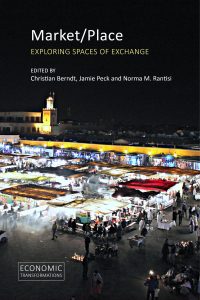
The term “market” originally portrayed a public space for economic transactions but the term has since evolved into an abstract and disputed idea. Despite modern markets seemingly omnipresent nature, their specific geographies have undergone relatively little analysis.
This collection of new essays rediscovers the physical space that markets inhabit and explore how the impact of political, social and economic factors determine the shape of a particular market space.
The essays present new research from the fields of geography, economics, political economy and planning and provide valuable case study material to show how markets are contested, constructed and placed. Rather than separate markets from the surrounding society and state, these essays connect markets to their wider context and showcase how economic geography can combine with other disciplines to throw new light on spaces of exchange.
Publication Date: March 26th 2020
Urban Studies Inside/Out: Theory, Method, Practice
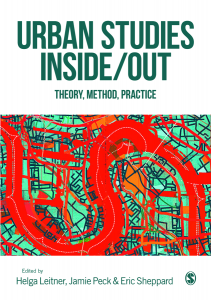
At a time of intense theoretical debates in urban studies, the research practices underlying such theories have not received the same attention. This original and creative text interrogates the methodological underpinnings of contemporary urban scholarship, with reference to different global sites and situations, as well as to recent debates around postcolonial, planetary, and provincialized urban theories.
Rather than reducing methodological questions to a matter of tools and techniques, it unearths the complex connections between theory, research design, empirical work, expositional style, and normative-ethical commitments.
Innovatively co-produced by faculty and graduate students from a variety of disciplines, Urban Studies Inside-Out is comprised of three parts.
Part I: An introduction to the field of urban studies and its changing theories, methodological norms and practices.
Part II: Features a collection of methodological essays co-authored by graduate students, deconstructing the research designs, the methodological practices, and the modes of presentation and representation across recent urban monographs.
Part III: Consists of informative keyword primers which explicate the key concepts and formulations in the field of urban studies.
This volume offers a welcome intervention within urban studies, and stands to make a valuable contribution for graduate students and researchers.
Publication Date: November 2019
Geography’s Quantitative Revolutions
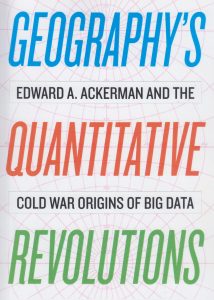
Do you have a smartphone? Billions of people on the planet now navigate their daily lives with the kind of advanced Global Positioning System capabilities once reserved for the most secretive elements of America’s military-industrial complex.
But when so many people have access to the most powerful technologies humanity has ever devised for the precise determination of geographical coordinates, do we still need a specialized field of knowledge called geography?
Just as big data and artificial intelligence promise to automate occupations ranging from customer service and truck driving to stock trading and financial analysis, our age of algorithmic efficiency seems to eliminate the need for humans who call themselves geographers—at the precise moment when engaging with information about the peoples, places, and environments of a diverse world is more popular than ever before. How did we get here?
This book traces the recent history of geography, information, and technology through the biography of Edward A. Ackerman, an important but forgotten figure in geography’s “quantitative revolution.” It argues that Ackerman’s work helped encode the hidden logics of a distorted philosophical heritage—a dangerous, cybernetic form of thought known as militant neo-Kantianism—into the network architectures of today’s pervasive worlds of surveillance capitalism.
Publication Date: November 1st 2019
Migration in Performance: Crossing the Colonial Present
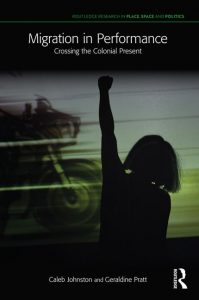
This book follows the travels of Nanay, a testimonial theatre play developed from research with migrant domestic workers in Canada, as it was recreated and restaged in different places around the globe.
This work examines how Canadian migration policy is embedded across and within histories of colonialism in the Philippines and settler colonialism in Canada. Translations between scholarship and performance – and between Canada and the Philippines – became more uneasy as the play travelled internationally, raising pressing questions of how decolonial collaborations might take shape in practice.
This book examines the strengths and limits of existing framings of Filipina migration and offers rich ideas of how care – the care of children, the elderly and each other – might be rethought in radically new ways within less violently unequal relations that span different colonial histories and complex triangulations of racialised migrants, settlers and Indigenous peoples.
This book is a journey towards a new way of doing and performing research and theory. It is part of a growing interdisciplinary exchange between the performing arts and social sciences and will appeal to researchers and students within human geography and performance studies, and those working on migration, colonialisms, documentary theatre and social reproduction.
Publication Date: October 22nd 2019
Mad Dogs and Other New Yorkers: Rabies, Medicine, and Society in an American Metropolis
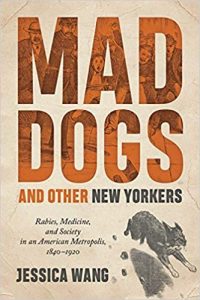
Rabies enjoys a fearsome and lurid reputation. Throughout the decades of spiraling growth that defined New York City from the 1840s to the 1910s, the bone-chilling cry of “Mad dog!” possessed the power to upend the ordinary routines and rhythms of urban life. In Mad Dogs and Other New Yorkers, Jessica Wang examines the history of this rare but dreaded affliction during a time of rapid urbanization.
Focusing on a transformative era in medicine, politics, and urban society, Wang uses rabies to survey urban social geography, the place of domesticated animals in the nineteenth-century city, and the world of American medicine. Rabies, she demonstrates, provides an ideal vehicle for exploring physicians’ ideas about therapeutics, disease pathology, and the body as well as the global flows of knowledge and therapeutics. Beyond the medical realm, the disease also illuminates the cultural fears and political contestations that evolved in lockstep with New York City’s burgeoning cityscape.
Mad Dogs and Other New Yorkers offers lay readers and specialists alike the opportunity to contemplate a tumultuous domain of people, animals, and disease against a backdrop of urban growth, medical advancement, and social upheaval. The result is a probing history of medicine that details the social world of New York physicians, their ideas about a rare and perplexing disorder, and the struggles of an ever-changing, ever-challenging urban society.
Publication Date: October 15th 2019